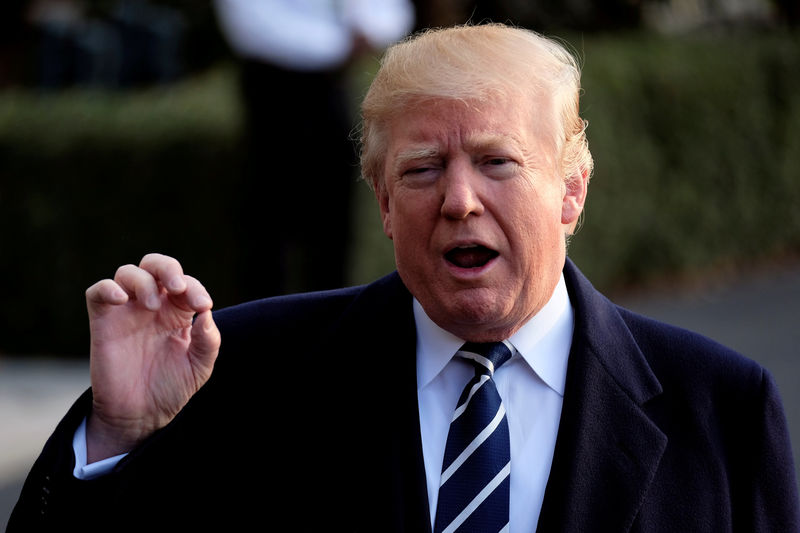By Richard Cowan and Susan Cornwell
WASHINGTON (Reuters) - President Donald Trump on Wednesday again raised the possibility of a U.S. government shutdown - blaming Democrats for that possible outcome - one day before he is due to host Republican and Democratic congressional leaders for talks on spending bills.
Trump and Congress are facing a deadline of Friday at midnight to pass fresh spending legislation. If they cannot agree on the terms, parts of the federal government could shut down.
Late on Wednesday, a bill advanced in the House of Representatives to extend current federal funding through Dec. 22, with the chamber expected to take up the bill on Thursday.
If that measure clears the House and Senate, as expected, major fights are in the offing over the next funding bill, which could fund the government until sometime in January.
Trump's warning about a shutdown came as conservative House members pushed for increases in military spending along with either a freeze or reduction in domestic programs.
Their bid is likely to be rejected by Democrats, who make up a minority in Congress, and could further complicate months of behind-the-scenes negotiations by congressional leaders aimed at figuring out government spending through the end of this fiscal year on Sept. 30, 2018.
While the House potentially could pass upcoming spending bills without any Democratic support, that tactic would not work in the Senate where procedural rules give Democrats bargaining power.
As a condition of backing new spending, many Democrats have demanded legislative protections for the nearly 700,000 undocumented immigrants who were brought into the United States as children. Trump pushed back, saying it could set the stage for impasse.
"The Democrats are really looking at something that is very dangerous for our country," Trump told reporters at the White House. "They are looking at shutting down."
House Democratic leader Nancy Pelosi countered in a tweet: "President Trump is the only person talking about a government shutdown. Democrats are hopeful the president will be open to an agreement to address the urgent needs of the American people and keep government open."
The infighting came as Republican congressional leaders labored to demonstrate that they can govern and spare the country the chaos of a government shutdown at Christmas time that likely would not sit well with voters.
63 PERCENT AGAINST SHUTDOWN
A partial government shutdown would leave "essential" services operating, but could disrupt programs ranging from the operation of national parks to educational programs and scientific research.
A Politico/Morning Consult opinion poll found that 63 percent of voters want Congress to avoid any shutdown, with 18 percent in favor if it helps lawmakers achieve policy goals.
In October 2013, conservative Republicans used the need to pass a funding bill to try to force repeal of the Affordable Care Act, also known as Obamacare. They failed but in the process forced a 17-day disruption of many federal agency activities.
The end-of-year fight over appropriations, which should have been settled nine weeks ago, is attracting a series of controversial add-ons from both Republicans and Democrats.
Republicans want to add as much as tens of billions of dollars to military spending this year and impose new work requirements for some recipients of Medicaid benefits, the healthcare program for the poor and disabled.
Democrats want to attach the immigration measure and a restoration of Obamacare subsidy payments for low-income people that Trump terminated.
Both parties seek additional disaster aid for Puerto Rico, Texas, Florida and other states.
Republican Representatives Mark Meadows, who heads the House Freedom Caucus, and Representative Mark Walker, chairman of the conservative Republican Study Committee, are touting the effort to pump up Pentagon spending without any increases to non-defense programs.

But Democrats have argued that inaction on the non-defense side of the ledger would usher in a new round of automatic spending cuts for those programs next month, short-changing programs that fight opioid addiction, fund medical research, veterans programs and an array of other activities.